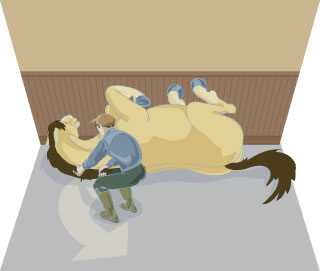 In late May, on our farm, there is only a brief period of utter silence during the dark of the night. Up until about 2 AM, the spring peepers are croaking and chorusing vigorously in our ponds and wetlands, and around 4 AM the diverse bird song begins in the many tall trees surrounding the house and barnyard.
In late May, on our farm, there is only a brief period of utter silence during the dark of the night. Up until about 2 AM, the spring peepers are croaking and chorusing vigorously in our ponds and wetlands, and around 4 AM the diverse bird song begins in the many tall trees surrounding the house and barnyard.
In between those bookend symphonies is stillness–usually.
I woke too early this morning aware of something being unstill. It was an intermittent banging, coming from the barn. I lay in bed, trying to discern the middle of the night noise that could be a sign of a major problem, like a horse stuck up against a stall wall or “cast” in horseman’s parlance, or simply one of my water-bucket-banging youngsters who enjoys nocturnal percussion.
This was not sounding like a bucket drum set. It was emphatic hooves frantically banging against metal walls.
Throwing on sweats and boots, I head out the back door into the mere light of pre-dawn, dewy, with the birds just starting to rouse from sleep, the floral perfume of lingering apple blossoms heavy in the air. Entering the barn, I throw on the lights and start to count the noses I can see in the stalls as I walk down the aisle~all present and accounted for until I get to the very end of the row. No nose. Down in the corner is our eleven year old mare on her side, too close to the wall, her feet askew up against the boards and metal siding. She nickered low to me, and my entering the stall sent her into a renewed effort to right herself, but all she could do was scrabble against the wall, digging an even bigger hole beneath her body.
This has happened infrequently over our 25 years of owning horses, usually when a horse is rolling to scratch their back and rolls too close to the wall, and becomes lodged there. Haflingers, who have a fairly round conformation, are a bit prone to being cast. Our older barn, with dirt floors, is particularly likely to having this happen, as depressions in the floor where horses have been digging end up becoming deeper and trap a hapless horse that was nonchalantly rolling. The horse literally is trapped like a turtle on its back.
Righting a 1000 lb. horse that is frantically flailing and struggling is not a particularly easy or safe task. Thankfully Haflingers tend to be pretty sensible in this situation and will calm when spoken to and reassured. I looped a rope around each lower leg, and with my tall strong son’s help, we were able to pull her back over and then jump out of the way quickly. She got up, shook herself off and immediately asked for breakfast–a good sign this was not a horse in distress or colicking with abdominal pain.
So my day started early.
I hope when I find myself trapped in a hole of my own making, when I’ve been careless about watching where I’m heading and find myself helpless and hopeless with no where to turn, someone will hear my struggles and come rescue me. I promise not to kick out or bite, but to wait patiently, in gratitude, for such gracious liberation. My cares will be cast upon my rescuer.
And then please, feed me breakfast.